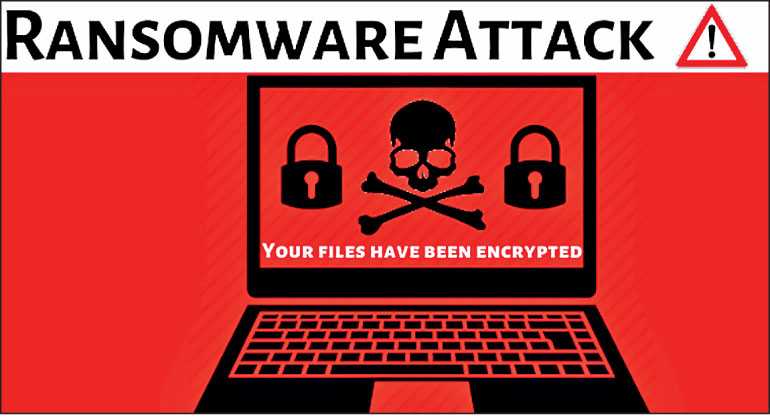Monday Feb 16, 2026
Monday Feb 16, 2026
Thursday, 21 May 2020 00:02 - - {{hitsCtrl.values.hits}}

Ransomware attacks have skyrocketed 148% during the height of COVID-19 crisis in March, compared to baseline levels in February, as corporations shift to remote work
Digital adoption is the silver lining in the COVID-19 dark cloud. As a result of COVID-19 lockdowns across the planet, there is a clear shift towards operating through digital means. From first world to remotest corner of the third world, all are embracing digital in an unprecedented manner. Though it is not the time to cheer, this is what digital advocates frantically tried for decades.
Digitally dependent new world order
Widespread network coverage and mobile phone ownership across all continents have created a conducive environment for online services take up during the lockdown. This unprecedented digital adoption in the early stage of 4th industrial revolution fuels it to supervene even faster. Hence post-pandemic new world order will be characterised by accelerated digital transformation by every single government and more and more citizens with digital lifestyles. So a new and widespread digital eco systems connecting citizens, governments and enterprise of all scale, though may not be very robust will emerge in the immediate post-pandemic period. This will create connected and inter-dependent virtual value chains from the remotest village in the third world to mega cities in the first world. What all this means is that post-pandemic new world order would be more digitally dependent.
Mistrust among nations
It also appears that the world, particularly the powerful nations have become more apprehensive about each other. Conspiracy theorists who blame China and vice versa for inventing a biological weapon to cripple economies have not been ridiculed by seers. Social media reported Japanese Nobel laureate Professor Tasuku Honjo’s claim of coronavirus being a manufactured biological weapon by Chinese establishment. Government of Japan introduced incentives to move manufacturing out of China while USA was indicating to follow suit. Indian television channels were going public accusing China of spreading the virus while brutally leveraging the crisis to buy and store oil and maze in volumes and actively picking up equities around the world. A German tabloid demanded Euro 150 billion compensation from China as damages. All these are signs of the mistrust amongst powerful nations and will continue to haunt the post-pandemic era.
Another notable phenomenon is the rise of religious intolerance and extremism. When vast scientific advancements fail to solve problems such as the coronavirus pandemic or bush fires in Australia, fanatics have the advantage to ridicule science and radicalise tech savvy followers who could be mobilised for destructive purposes in the digital domain.
Threat of a digital COVID-19
The use of force against autocracies in the Middle East versus taking mighty China on in a conventional war using air, sea and ground forces would be a completely different ball game and a fiercely dangerous one. Hence digital would be the most likely theatre of cold war in the future. Weakening enemy digital capabilities and disrupting digital value chains will be strategic weapons in more and more digitally dependent post-pandemic world.
Terrorist outfits would find digitally dependent governments and e-commerce eco systems as attractive targets for offensive disruptions. Ongoing pandemic has given them a good sense as to what level of destruction they could create if they have a digital COVID-19 at their disposal.
Lately computer viruses have taken the backseat as ransomware has come to the fore. Ransomware attacks have skyrocketed 148% during the height of COVID-19 crisis in March, compared to baseline levels in February, as corporations shift to remote work according to the sources of information security companies. More and more successful ransomware attacks and earnings from them have tremendously motivated cyber criminals to innovate more sophisticated attacks. As a result, more ransomware war lords are emerging in the dark web. Cyber criminals would be busy trying to invent a digital equivalent of coronavirus which can rapidly spread from one mission critical system to another in order to claim massive bail out ransoms. This is the most probable threat that is imminent in immediate post-pandemic period.
If a digital equivalent of coronavirus starts to spread rapidly across global mission critical digital infrastructure such as nuclear power plants, nuclear warfare, space stations, healthcare systems, air traffic control systems, telecommunication networks, power generation and distribution systems, water and reservoir management systems, immigration and airline reservation systems, customs, fiscal and revenue collection systems, banking, capital markets and credit Information platforms, citizen databases and identity platforms, etc., it could cause a colossal and probably an irretrievable damage.
Dealing with a digital pandemic
World leaders and policy makers ought to pay attention to this risk and prepare the planet with mitigation strategies and measures to deal with it. COVID-19 was an example where the world leaders failed to act collectively for a swift response. Institutions which were established to provide the leadership miserably failed. WHO could not take proactive measures to avoid the spread of the virus across borders and the need for having accountable and competent leaders to run global agencies was highlighted. UN has been demonstrating a pitiful role of an observer.
United Nations does not have a focused outfit for combatting global cybercrimes and a meagre sub program under UN office on Drug and Crime (UNODC) which too depends on the generosity of only five countries. Interpol on the other hand plays more active in global cybercrime combating. European commission’s Budapest Convention on Cybercrime is the first international treaty set out to pursue a common criminal policy against cybercrime, of which Sri Lanka too is a signatory. However, there is no global institution with an adequate mandate and capacity to provide the leadership to combat a COVID-19-like digital pandemic.
Way forward
World has to be ready for a possible digital catastrophe similar to COVID-19 pandemic sooner than later. COVID-19 has given cyber criminals an exciting use case in the biological world to emulate. COVID-19 has opened up the eyes of cyber criminals for new possibilities of large scale destruction and pointers to new ransom making opportunities.
Global leaders have to pay attention to this new reality and the imminent threat. Policy makers should focus on creating a global institution with a focused mandate to take the leadership in governing global cyber affairs, setting policies and strategies to make global digital eco systems are robust, safer, efficient and fairer place for all countries and equipped with necessary resources.
Having witnessed the miserable failure of WHO and UN in managing COVID-19 pandemic, the design of the new institutions should be done in such a way that the leaders of these institutes are held accountable for failures of executing its mandate. This is not a new area of science or expertise but it is yet to be organised as a collective global effort when bracing for a possible digital pandemic. Sri Lanka has the opportunity to be a catalyst and lead the shaping of this new digital paradigm.
(The writer is an engineer by profession and former CEO of ICTA.)
Digital network is the livewire for the world to operate during the COVID-19 pandemic. If a digital equivalent of coronavirus starts to spread across global ICT infrastructure such as healthcare systems, telecommunication networks, e-commerce platforms, banking and financial systems, power and water utility systems, customs, revenue collection systems, etc., damage from the catastrophe and the plight of humanity would be unimaginable
The world’s heavy dependence on connected digital eco-systems in the post pandemic era makes them more attractive for attacks. A digital corona virus could emerge as a result of cyber cold war amongst nations, cyber-attack by terrorist outfits or malware-attack by cyber war lords for ransoms
World leaders and policy makers ought to pay attention to this risk and prepare the planet for mitigation strategies and measures to deal with it. COVID-19 was an example where world leaders collectively failed to act together for a swift response. WHO could not take proactive measures to avoid the spread of the virus across borders and UN has been demonstrating a pitiful role of an observer.
Having witnessed the miserable failure of WHO in managing the COVID-19 pandemic, the design of the new institutions should be done in such a way that the leaders of these outfits are held accountable for failures in executing the mandate.